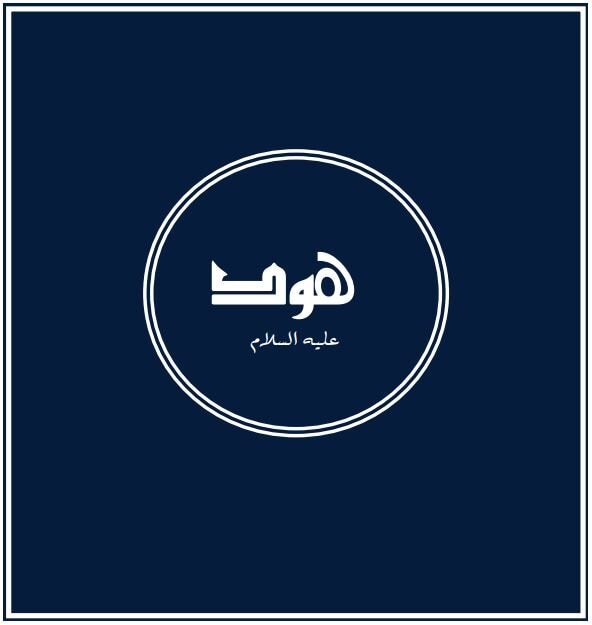“And We did raise among every people a Messenger”
Jalees Ahmad, Al Hakam

Prophet Hudas was a prophet who lived after Noahas [Nuh], being the seventh in descent from Nuhas. (Five Volume Commentary, Volume II, p. 996). The Holy Quran states he was sent to the people of ‘Ad.
“The tribe of ‘Ad, at one time, ruled over most of the fertile parts of greater Arabia, particularly Yemen, Syria and Mesopotamia. They were the first people to exercise dominion over practically the whole of Arabia. They are known as ‘Adani l-’Ula or the former ‘Ad.” (Five Volume Commentary, Volume II, p. 997)
Alluding to Hudas, the Holy Quran states:
“And unto ‘Ad We sent their brother Hud” (Surah al-A‘raf, Ch. 7: V. 66).
Further, we read:
“And to Thamud We sent their brother Salih.” (Surah al-A‘raf, Ch.7: V.74).
And:
“And to Midian We sent their brother Shuʻaib” (Surah al-A‘raf, Ch.7: V.86).
Concerning these three prophets – Hudas, Salihas, and Shuʻaibas – Hazrat Musleh-e-Maudra explained:
“The verses mean that Hud, Salih and Shu‘ayb were in close association with their respective peoples, so that those peoples could be said to know everything about them.” (Introduction to the Study of the Holy Quran, p. 9)
Who were the people of ‘Ad?
As mentioned above, Prophet Hudas was sent to the people of ‘Ad. “And unto ‘Ad We sent their brother Hud” (Surah al-A‘raf, Ch.7: V.66).
Hazrat Musleh-e-Maudra, in his commentary of Surah Hud, mentions that European critics deny that the people of ‘Ad, known as ‘Adites, existed because no inscription found in Arabia bears their names. From this, they say the Holy Quran has merely mentioned a fable heard from old Arabian stories.
Huzoorra explains that the human race could be generally known by two categories: (i) a name representing an entire race, which is known as a collective name; (ii) a group within an entire race. Huzoorra gives the example of Aryans and states that this was a collective name of an entire race. Within it, there were groups and tribes. Now, in this era, it would be absurd for one to say that other names of races are found but such a name was not found and so it must be fictitious.
Huzooras further explains that, according to him, ‘Ad consisted of a group of tribes and among the tribes, at different times, some tribes continued to gain dominance and rule and would instil inscriptions of their particular group. However, they all belonged to the ‘Ad.
Geographical work in Greece mentions that in the pre-Christian era, Yemen was governed by a tribe named ‘Adramitai. This is the very tribe the Quran refers to as ‘Adi Iram in Surah al-Fajr. (Tafsir-e-Kabir, Vol. 3, p. 203) (For more recent research in this regard, see Fawzi Zayadine and Saba Farès-Drappeau, “Two North-Arabian Inscriptions from the Temple of Lāt at Wādī Ramm,” ADAJ 42 (1998) 255–58, Robert Hoyland, “Mount Nebo, Jabal Ramm, and the Status of Christian Palestinian Aramaic and Old Arabic in Late Roman Palestine and Arabia,” Proceedings of the Seminar for Arabian Studies 40 (2010) 29–45, and Healey, J. F. (2001). The Religion of the Nabataeans. Leiden: Brill.)
Surah Hud
There is a chapter in the Holy Quran, titled Surah Hud, in which the Quran explains how Allah Almighty deals with the enemies of his messengers. This chapter mentions prophets of God such as Noahas, Hudas, Salihas, Lotas [Lut], and Shu‘aibas. It further mentions Prophet Mosesas [Musa] and the people of Pharaoh who behaved arrogantly. We further learn, in this surah, that even though attaining progress in the world is possible when people keep away from God, only those who are loyal and obedient to Allah shall be remembered on this earth.
Hazrat Musleh-e-Maudra writes that this surah has cited many instances of divine punishment and the importance of the Holy Prophet’ssa great responsibility has been made clear, who is reported to have said:
شَيَّبَتْنِيْ هُوْدٌ
Meaning that ‘(Surah) Hud has aged me.’ i.e. the subjects of the Surah weighed heavily on the Holy Prophet’ssa mind that he felt the impact of old age. (Tafsir-e-Kabir, Vol. 3, p. 140)
Prophet Hud’sas call
The Holy Quran, referring to Prophet Hudas, states:
“And unto ‘Ad [We] sent their brother Hud. He said, ‘O my people, worship Allah; you have no other deity but Him. Will you not then be Godfearing?’” (Surah al-A‘raf, Ch.7: V.66)
This verse highlights that all prophets came with the same message; the message of tawheed. Throughout history, we read of various prophets who came to their people with a teaching to guide them to the right path from which they had deviated. The Holy Quran states the source of their divine teaching was the One Being, the Almighty.
Those who disobey the message of Allah are usually blind to observing and obtaining spirituality. Hud’sas people labelled him with two charges. They said, upon hearing his call:
“‘We surely see thee [lost] in foolishness, and we surely think thee to be [one] of the liars.’” (Surah al-A‘raf, Ch. 7: V.67)
Hudas, as all prophets did, explained to his people that he was from the Almighty God and was “a sincere and faithful counsellor.” (Surah al-A‘raf, Ch.7: V.69)
Here, it was as if Hazrat Hudas was saying that he had no ulterior or hidden motive; he was expressing that he was simply being sincere with them. Elsewhere in the Holy Quran, we read that Hudas told his people to fear Allah “‘Who has helped you with all that you know. He has helped you with cattle, and sons, And gardens, and springs.’” (Surah ash-Shu‘ara’, Ch.26: V.133-135)
After all this, his people said, “‘This is nothing but a habit of the ancients.” (Surah ash-Shu‘ara’, Ch.26: V.138)
Thus was the foolish way of the people of ‘Ad who treated Hud’sas warnings as a mockery. They were arrogant people who took great pride in themselves.
The people of ‘Ad said that they were simply following what their forefathers did and said, “‘Bring us, then, that which thou threatenest us with, if thou art of the truthful.’” It is often seen that people, lost in their ways, do not desire to change or mend them.
Hazrat Hudas replied:
“‘Indeed there have [already] fallen on you punishment and wrath from your Lord. Do you dispute with me about names which you have named,—you and your fathers,—for which Allah has sent down no authority? Wait then, I am with you among those who wait.’” (Surah al-A‘raf, Ch.7: V.72)
Certainly, the people of Hudas were stubborn in their ways. They left the One True God and remained firm in their worship of idols. They said to Hudas, “‘We are not going to forsake our gods merely because of thy saying, nor are we going to believe thee.’” (Surah Hud, Ch.11: V.54)
Allah states:
“And We saved him and those who were with him, by Our mercy, and We cut off the last remnant of those who rejected Our Signs. And they were not believers.” (Surah al-A‘raf, Ch.7: V.73)
The Holy Quran and ‘Adites
Hazrat Musleh-e-Maudra, referring to the Holy Quran, has mentioned the following about the people of ‘Ad:
1. In Surah al-Fajr, the Holy Quran states that the people of ‘Ad were a powerful people and were possessors of lofty buildings:
اَلَمۡ تَرَ كَيۡفَ فَعَلَ رَبُّكَ بِعَادٍ۔ اِرَمَ ذَاتِ الۡعِمَادِ۔ الَّتِيۡ لَمۡ يُخۡلَقۡ مِثۡلُهَا فِي الۡبِلَادِ
“Hast thou not seen how thy Lord dealt with ‘Ad — The [tribe of] Iram, possessors of lofty buildings, The like of whom have not been created in [these] parts” (Surah al-Fajr, Ch.89: 7-9)
No other people in Arabia had attained such heights as the people of ‘Ad.
Hazrat Musleh-e-Maudra states that from the verse of Surah al-Fajr, we come to know that the tribe of ‘Ad was called Iram, a kingdom that possessed great power. They spoke the Aramaic language.
2. The people of ‘Ad lived after Noahas. Alluding to them, the Holy Quran states:
“And remember [the time] when He made you inheritors [of His favours] after the people of Noah.” (Surah al-A‘raf, Ch.7: V.70)
3. The people of ‘Ad were well-known for building lofty monuments. The Holy Quran records Prophet Hudas saying to his people:
“‘Do you build monuments on every high place seeking vain glory,’” (Surah ash-Shu‘ara’, Ch.26: V.129)
Hazrat Musleh-e-Maudra stated that there still could be found ruins of buildings in Arabia. Huzoorra states that he has seen the remains of lofty buildings not far from Aden.
4. The people of ‘Ad were so totally ruined that it seems only a few remains of their building can be found. The Holy Quran states, alluding to the ‘Adites:
“And they became such that there was nothing left to be seen, except their dwellings.” (Surah Al-Ahqaf, Ch.46: V.26)
5. The people of ‘Ad lived in sand-hills. The area they lived in, as mentioned in the Holy Quran, is Ahqaf. The Holy Quran states:
“And make mention of the brother of ‘Ad, when he warned his people among the sandhills” (Surah al-Ahqaf, Ch.46: V.22)
6. The Holy Quran states that the people of ‘Ad were destroyed by a fierce roaring wind, “which He caused to blow against them for seven nights and eight days consecutively” (Surah al-Haqqah, Ch.69: V.8) causing their lofty buildings and monuments to be buried under sand. (Tafsir-e-Kabir, Vol. 3, pp. 203-204)
The end of the people of ‘Ad
The destruction of the people of ‘Ad came because they “denied the Signs of their Lord and disobeyed His Messengers and followed the bidding of every haughty enemy of truth. And a curse was made to follow them in this world, and on the Day of Resurrection. Behold! the tribe of ‘Ad behaved ungratefully to their Lord. Behold! cursed are ‘Ad, the people of Hud!” (Surah Hud, Ch.11: V.60-61)
The disobedience of a prophet is akin to closing the doors of guidance with one’s own hands. It is as if a man feels that he himself is capable of achieving great heights in life and needs no divine help. The people of ‘Ad serve as a reminder that man, no matter how lofty his buildings and dwellings, is nothing without God. It was with regard to Surah Hudas, that the Holy Prophet expressed that the subjects of the said Surah weighed heavily on his mind.
In light of ‘Ad and Prophet Hudas, the Holy Prophetsa is recorded to have said:
يَرْحَمُنَا اللّٰهُ وَاَخَا عَادٍ
“May Allah have mercy on us and on our brother of ‘Ad [meaning Prophet Hudas].” (Sunan Ibn Majah, Kitab al-Dua, Hadith 3852)
Salihas was the messenger after Hudas
Mankind being in constant need of guidance, Allah continued to send prophets also after the people of ‘Ad. When we read the Holy Quran, especially about Prophet Hudas, we will find a recurring pattern. In various places, Prophet Hudas has been mentioned alongside Prophet Salihas. Prophet Salihas was the messenger who was sent after Hudas.
It is stated in the Five Volume Commentary:
“[…] The account of Hud precedes that of Salihas which is the true chronological order. This shows that the Quran gives accurately and in their true historical order the facts of history long consigned to oblivion and wrapped in obscurity.” (Five Volume Commentary, Vol. III, p. 1363)



Well done.
Where did you get that the adites spoke Aramaic? I don’t think this is right. Ad and Thamud are considered to be arabs.